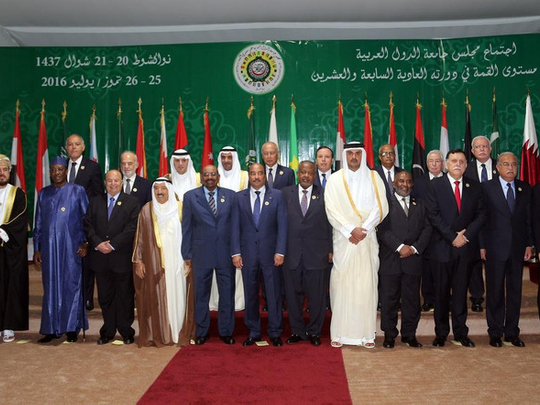
To say that the convening of the Arab Summit on Wednesday in the Dead Sea in Jordan comes at a critical time for the region is an understatement. Still the timing and the location are pivotal for millions of Arabs who will be watching their leaders meet to discuss ways to bolster Arab ranks and revive an ailing Arab national order.
King Abdullah had offered to host the summit when war-torn Yemen declined. He is a leader who has spent time and effort to prepare the political climate for a successful meeting at the highest level. Historically, Jordan had played a crucial role in preserving the institution of the Arab Summit as the only viable vehicle to address regional challenges and overcome inter-Arab schisms. Its record speaks for itself especially when Amman hosted the ‘Arab Accord’ summit in 1988 to bring about short-lived reconciliation. Previously, Jordan’s role was instrumental in re-admitting Egypt into the Arab fold following the signing of the Camp David agreement in 1979.
But good intentions by the host country are not enough. There has to be a political will on behalf of Arab leaders to turn the corner and open a new chapter in inter-Arab relations. The cost of failing to do so will be enormous. And naturally, a two-day meeting will not be sufficient to end conflicts and address solutions. What one can hope for is for Arab leaders to agree on a set of mechanisms to deal with looming challenges and threats. King Abdullah, a leader who believes in moderation and in a practical approach to complex issues, will try to present these mechanisms. And he will need the help of like-minded sensible leaders to reach common grounds.
The summit will deal with a number of issues that include political, economic and cultural challenges that the Arab world faces today. If there is a lesson that Arab leaders must have learnt from the events of the past five or six years is that no single country can face these challenges alone. A united Arab stand is needed to establish a meaningful dialogue with the rest of the world. Whether it is the Palestinian issue, the war in Syria, or fighting militant groups that have hijacked Islam and claim to represent it, Arabs need to speak in one voice. Failure to do so will whet the appetite of regional foes and big powers that seek to embolden their presence in one of the most important regions in the world today.
On Palestine, which remains the central cause for all Arabs, there must be a strong and united Arab stand that rejects attempts to go around the two-state solution. King Abdullah has underlined this position on more than one occasion. But his should not be a lonely voice. Other influential leaders must come forward to bolster that stand. The new United States administration must be made to understand that departure from this cornerstone to any just and lasting political settlement will invite chaos and destabilise the region further. The Arab Peace Initiative remains the best offer on the table and it should not be amended or partitioned, as Israel’s right-wing leadership is hoping, to go around direct negotiations between Israel and the Palestinians based on United Nations resolutions and previously agreed upon treaties and agreements.
The Arab leaders face tough choices on Syria. After six long and bloody years, no military solution to the conflict is yet possible. Syria’s future and territorial integrity rest on arriving at a political solution that meets the aspiration of its people. The Arabs must recognise that political polarisation and foreign intervention in Syria’s affairs have complicated the problem. Only a united Arab position will save Syria from disintegration — something that will create a dangerous power vacuum that will engulf the entire region in turmoil for decades.
The same goes for Iraq, Yemen and Libya. Foreign intervention in all of these conflicts was made possible by the fact that Arab countries adopted different and diverse agendas.
The message from Jordan must be one of a united front, manifesting the resurgence of a realistic bloc of countries that rely less on emotional cliches and more on common political interests and economic integration.
But most importantly, there is an urgent need to adopt a new vision for the Arab League itself — one that is adapted to 21st century realities and challenges. In that sense, the various economic and cultural outlets of the Arab League must be dynamically reanimated so that they can address the needs and aspirations of tens of millions of young Arabs who triggered the so-called Arab Spring storm out of despair and frustration. They represent the future and the unutilised potential of this vast and rich region and they must be allowed to participate in the making of that future.
Osama Al Sharif is a journalist and political commentator based in Amman.












